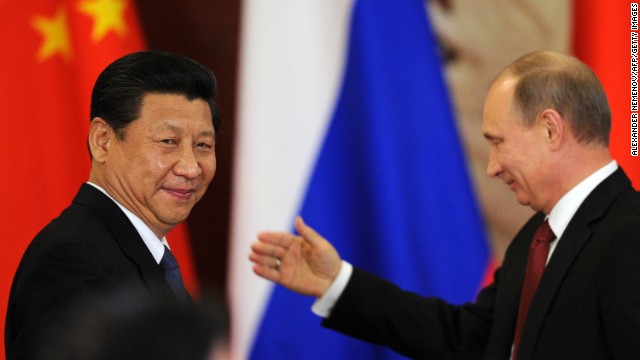MOSCOW (AP) — Russian President Vladimir Putin said Thursday there is no need for a Russia-China military alliance now, but noted it could be forged in the future.

Putin’s statement signaled deepening ties between Moscow and Beijing amid growing tensions in their relations with the United States. The Russian leader also made a strong call for extending the last remaining arms control pact between Moscow and Washington.
Asked during a video conference with international foreign policy experts Thursday whether a military union between Moscow and Beijing was possible, Putin replied that “we don’t need it, but, theoretically, it’s quite possible to imagine it.”
Russia and China have hailed their “strategic partnership,” but so far rejected any talk about the possibility of their forming a military alliance.
Putin pointed to the war games that the armed forces of China and Russia held as a signal of the countries’ burgeoning military cooperation.
Putin also noted that Russia has shared sensitive military technologies that helped significantly boost China’s military potential, but didn’t mention any specifics, saying the information was sensitive.
“Without any doubt, our cooperation with China is bolstering the defense capability of China’s army,” he said, adding that the future could see even closer military ties between the two countries.
“The time will show how it will develop,” the Russian president said, adding that “we won’t exclude it.”
Russia has sought to develop stronger ties with China as its relations with the West sank to post-Cold War lows over Moscow’s annexation of Ukraine’s Crimea, accusations of Russian meddling in the 2016 U.S. presidential election and other rifts.
Putin on Thursday emphasized the importance of extending the New START treaty that expires in February, Russia’s last arms control pact with the United States.
Earlier this week, the United States and Russia signaled their readiness to accept compromises to salvage the New START treaty just two weeks ahead of the U.S. presidential election in which President Donald Trump faces a strong challenge from former Vice President Joe Biden, whose campaign has accused Trump of being soft on Russia.
New START was signed in 2010 by then-U.S. President Barack Obama and then-Russian President Dmitry Medvedev. The pact limits each country to no more than 1,550 deployed nuclear warheads and 700 deployed missiles and bombers, and envisages sweeping on-site inspections to verify compliance.
Russia had offered to extend the pact without any conditions, while the Trump administration initially insisted that it could only be renewed if China agreed to join. China has refused to consider the idea. The U.S. recently modified its stance and proposed a one-year extension of the treaty, but said it must be coupled with the imposition of a broader cap on nuclear warheads.
The Kremlin initially resisted Washington’s demand, but its position shifted this week with the Russian Foreign Ministry stating that Moscow can accept a freeze on warheads if the U.S. agrees to put forward no additional demands.
Putin didn’t address the issue of the freeze on warheads, but he emphasized the importance of salvaging New START.
“The question is whether to keep the existing treaty as it is, begin a detailed discussion and try to reach a compromise in a year or lose that treaty altogether, leaving ourselves, Russia and the United States, along with the rest of the world, without any agreement restricting an arms race,” he said. “I believe the second option is much worse.”
At the same time, he added that Russia “wasn’t clinging to the treaty” and will ensure its security without it. He pointed at Russia’s perceived edge in hypersonic weapons and indicated a readiness to include them in a future pact.
“If our partners decide that they don’t need it, well, so be it, we can’t stop them,” he said. “Russia’
Despite indications earlier this week that Russia and the U.S. were inching closer to a deal on New START, the top Russian negotiator said that “dramatic” differences still remain and strongly warned Washington against making new demands.
Sergei Ryabkov cautioned the U.S. against pressing its demand for more intrusive control verification measures like those that existed in the 1990s and aren’t envisaged by the New START. The diplomat argued that new control mechanisms could be discussed as part of a future deal, saying firmly that Russia will not accept the demand that amounts to “legitimate espionage.”
“If it doesn’t suit the U.S. for some reason, then there will be no deal,” Ryabkov was quoted by the Interfax news agency as saying.
ASSOCIATED PRESS

Leave a Reply
You must be logged in to post a comment.